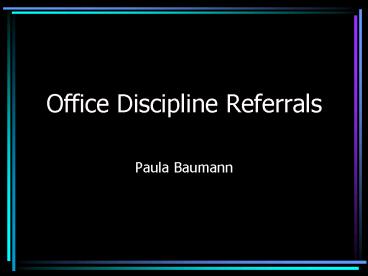Office Discipline Referrals - PowerPoint PPT Presentation
1 / 14
Title:
Office Discipline Referrals
Description:
The first task for a school staff is to specify which behaviors are handled in ... of board policy or state law (weapons, assault, contraband, harassment... – PowerPoint PPT presentation
Number of Views:1274
Avg rating:3.0/5.0
Title: Office Discipline Referrals
1
Office Discipline Referrals
- Paula Baumann
2
Defining Office Managed Behaviors
- The first task for a school staff is to specify
which behaviors are handled in the learning
environment and which behaviors are directed to
an office intervener.
3
Assumption School-wide systems are in place.
- School is establishing and teaching expectations.
- Staff builds positive relationships with students
and families. - Instruction is appropriate and students can be
successful academically. - Environments are predictable, orderly, and calm.
- Staff are visible and provide ongoing feedback to
students about behavior.
4
Out of instructional control
- Classroom managed
- Behavior that responds to a teaching
intervention. - Behavior that is not highly disruptive.
- Behavior that can be ignored, dealt with as part
of an ongoing plan, or managed with staff on hand.
- Office Managed
- Behavior that is serious or an infraction of
board policy or state law (weapons, assault,
contraband, harassment) - Escalation of misbehavior, not responsive to
intervention, disruptive. - Chronic, repetitive misbehavior that is resistant
to change and has become disruptive.
5
Teachers role in an ODR-
- Avoid escalating behavior
- Maintain a modulated voice, keep hands away from
student, do not use threats, avoid power
struggles.
6
Teachers role prior to ODR-
- Give specific objective instructions to stop
inappropriate behavior, Youre swearing, you
need to be quiet.. - Reinforce any approximations of desired behavior.
- Offer empathy. I know its difficult to accept
feedback Give the student opportunity to
regain control. - If student does not respond, inform him/her that
continued inappropriate behavior will result in
an office referral.
7
Teachers role in an ODR-
- Once the teacher has requested an ODR, the
teacher should not continue to discuss the
content of the issue or attempt a corrective
teaching intervention. - The teacher completes an ODR form.
- The teacher is calm and maintains safety.
- The teacher describes the behavior in objective
terms (circumstances, frequency, severity, words
said, when, what, who without judgmental
descriptors.)
8
The intervention.
- System is in place for staff assistance at any
time. - The intervener is calm, does not rush
intervention, and creates plan for the child to
return to the learning environment. - Child has opportunity to discuss his/her
perspective.
9
The intervention
- Child is held accountable for work and time
missed. - The intervention is documented.
- Consequences are reasonable, respectful, and
relevant. Consider restitution, restorative
justice, and communication with family. - Remember that consequences are not sufficient to
change behavior in the long term. - It is not fair to up the punisher without
considering teaching and prevention.
10
Child returns to learning environment.
- The teacher accepts the child back into the
learning environment. - The teacher uses a high rate of positives for
this child as they return and are successful.
11
Know the cycle of acting out.
- Cycle Calm, triggers, agitation, acceleration,
peak, de-escalation, and recovery. - Knowing the triggers and signs of agitation can
prevent peak behavior.
12
Office Referral Forms
- Include
- Time
- Location
- Others involved
- Problem behavior
- Possible Motivation (obtain or avoid peer or
adult attention, tasks or items)
13
ODR Data
- A team meets regularly and uses up-to-date data
to determine appropriate responses (school-wide,
targeted, or individual) for behavior issues.
14
Individual plans
- When a child receives two or more office
discipline referrals, the school team may look at
the function of his or her behavior. - A function based individual behavior plan will
address setting events, antecedents, teaching
skills, and use of consequences to decrease
inappropriate behavior and increase appropriate
behavior.































